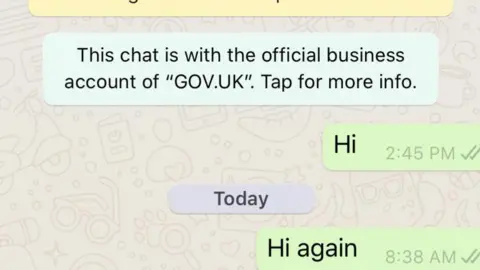Coronavirus: UK’s WhatsApp bot working after false start
 BBC
BBCA Covid-19 WhatsApp bot set up by the UK government is finally working after problems during launch on Wednesday.
Members of the public who message the bot can access pre-determined chunks of advice on symptoms or how to avoid spreading the disease, for example.
But it failed to work for some users after its launch, providing nothing more than an error message.
However, the BBC has verified that the bot, which also warns about coronavirus myths, is now working as intended.
One of those who encountered initial teething problems, Hashir Milhan, says all seems to be resolved.
“I tried sending the opening ‘hi’ message with no response,” London-based designer Mr Milhan told the BBC.
He said the bot did respond later – but only to send him an error message.
But on Thursday, he was able to access the information without problems.
He noted that the information was generally available online but added: “It’s reassuring that this comes from a verified account.”
The government said the service was designed to allow members of the public to "get answers to the most common questions about coronavirus".
But Mr Milhan said he had hoped the bot would be able to engage in and understand conversations, in order to respond to queries people might have on the spot.
To start receiving messages, users should send “hi” via WhatsApp to the number 07860 064422. International users can use +44 7860 064 422.

- LIVE: Latest updates from the BBC
- A SIMPLE GUIDE: What are the symptoms?
- AVOIDING CONTACT: Should I self-isolate?
- STRESS: How to protect your mental health
- MAPS AND CHARTS: Visual guide to the outbreak

The UK government does not have an official emergency alert system with which to contact citizens directly during a crisis.
However, authorities are distributing information through various channels, including websites and social media, as well as the new WhatsApp bot.
Telecoms firms were also asked to send out an alert to all customers via text message this week, stating that people must now stay at home as much as possible.
The texts have rolled out gradually to users and scammers have already tried to take advantage of the situation.
Some have sent fake messages accusing individuals of leaving their homes more than once a day - the limit set by the government - and telling them they are now liable to pay a fine.
Number 10 said people should trust only the official message.